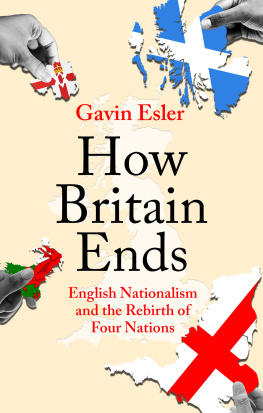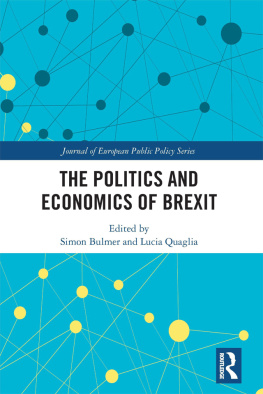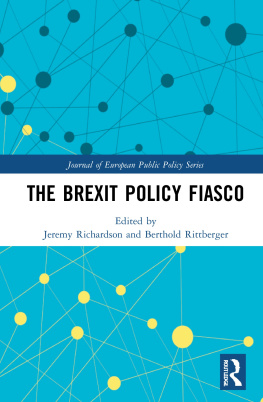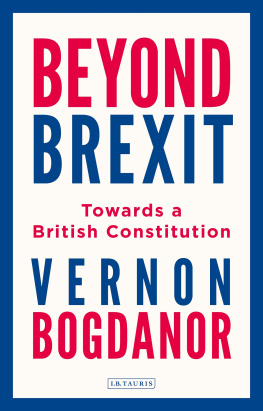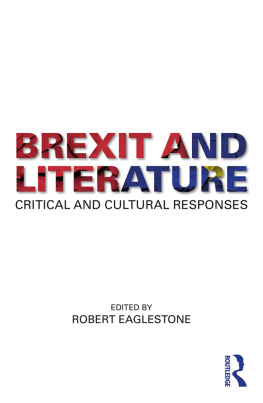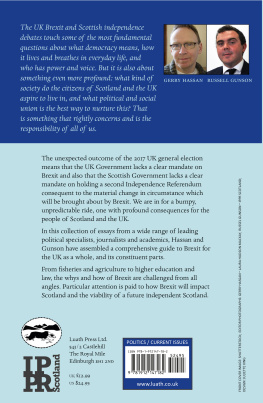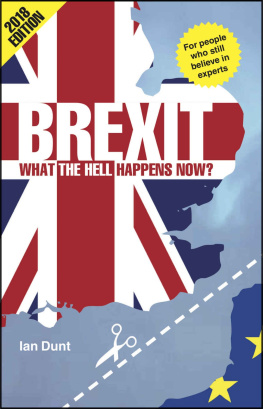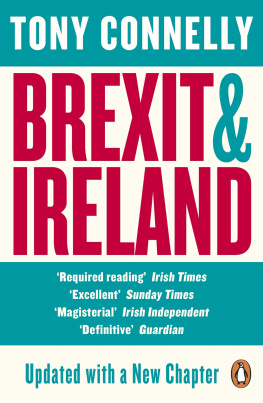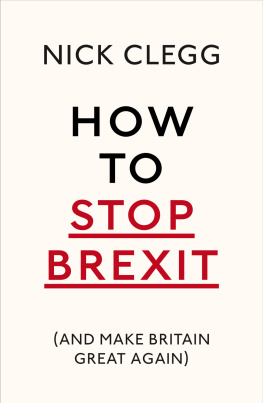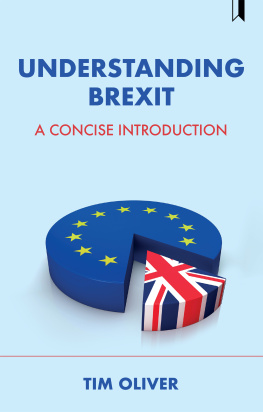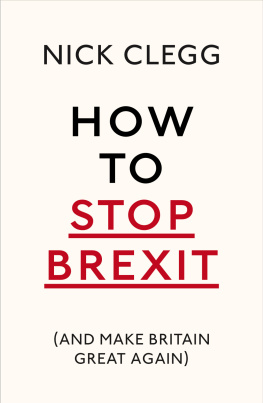Introduction
What is Brexit really going to look like? After 50 years of Britain arguing about Europe, what does leaving the European Union mean for you, me, our families, children, jobs, health care, and our daily lives? Shorn of the posturing and the promises, what are the profound changes that lie ahead? This book is not about the endless arguments over Brexit. It is about facts which will mould the future of our country. These facts, pleasant and unpleasant, should have been discussed properly when we held the referendum to leave in 2016. They werent. For good or ill, they are vital now to understand the possible shape of a new United Kingdom. This, then, is not a book about the Brexit you may have thought you were voting for. Its about the Brexit we will get.
The most important tip I can give you is not to think of Brexit as an event. Brexit is a process. It will take years to unfold. It has already exposed serious weaknesses in our democracy and deep divisions within the British government, inside both the Conservative and Labour parties, between Scotland and England, in the communities of Northern Ireland, and between families, friends, work colleagues and neighbours. These wounds will take time to heal. Formally leaving the EU is the beginning not the end of creating a new story for the UK, making new trade, security and other arrangements with Europe, with the rest of the world, and with each other.
We need to think about making the most of the opportunities ahead. But we also need to consider the realities of ending a relationship which has lasted almost half a century. The Brexit negotiations have raised legitimate fears that we may lack skilled trade negotiators and politicians who are up to the job. Questions have been raised about whether the competence and standing of the United Kingdom has been so diminished that future trade relationships with such powers as the US, Japan and China may reveal further weaknesses on our part. Hearings by the American negotiator, the US Trade Representative, have revealed American businesses see great opportunities in Brexit for them. Well-funded American interest groups representing agri-business, pharmaceuticals, health care and high-tech industries have been lobbying the US government. They are openly demanding the UK accept American food standards and reject European ones as the price of a future trade deal. A key demand is for American firms to be able to carve out chunks of the National Health Service.
Making the best of Brexit, then, is clearly not as easy as some of the more inventive have our cake and eat it promises and take back control slogans. But we need to give it our best shot. That means ignoring the slogans and focusing on a sober assessment of the challenges ahead.
Who and What We Are Up Against
Brexit requires the biggest transformation of the UK since World War Two, something far more ambitious than Margaret Thatchers 1980s shock therapy, when she sold off council housing, privatised state industries, checked union power, liberated the Falklands, and confronted the Soviet Union. Brexit has already involved rethinking the United Kingdoms foreign, economic, trade, migration, health and social care policies and security relationships. It also means turning thousands of European Union laws and regulations into workable British equivalents.
During the 2016 Brexit campaign, the Conservative Cabinet minister Michael Gove claimed that the British people have had enough of experts. Yet in the ensuing years, experts have been exactly what we have needed, and often sorely missed. In trade matters, the absence of expertise has been exposed. Rolling over existing EU trade deals with Japan and Turkey to apply to the UK after Brexit has proved impossible for British trade negotiators. To make Brexit work now, Britain needs to secure a degree of positive cooperation from the remaining 27 EU members. Given the acrimony and derision which British government efforts have directed at EU leaders, this will not be easy.
Since the Brexit vote I have travelled widely across Europe, to Belgium, Estonia, France, Germany, Holland, Ireland, Italy, Norway, Spain and Sweden. British people sometimes forget that politicians and many ordinary citizens in these countries read our newspapers, watch BBC news, and often have very positive views about British culture and competence. Our reputation for practical hard-headedness has taken a knock. Comedy programmes have poked fun at our position and the eccentricities of our parliament. Irish childrens TV has explained Brexit in terms understandable to five-year-olds. French, Dutch and Swedish cartoonists caricature leading Brexiters as cliches of a stuck-in-the-past Britain. Sober German news magazines have taken to describing the leading Brexit advocate Jacob Rees-Mogg as das lebendes Fossil, the living fossil.
Beyond the jokes and insults, the serious point is that making Brexit work is daunting. The central difficulty is not principally because the other heads of government in the European Council, the Merkels, Macrons and Varadkars, or EU negotiators like Michel Barnier and Sabine Weyand want to punish Britain. Brexit is difficult because all these prime ministers and parliaments in the 27 other member states have their own political pressures and priorities. The post-Brexit future of the UK is not top of anyones list, except our own. We must understand that and proceed in a spirit of constructive competence with our EU neighbours, not resentment or suspicion.
We will need to be industrious. Brexit will touch our homes and kitchens, our restaurants and supermarkets, our hospitals, schools, and workplaces. An estimated 12,000 EU regulations which have been operating in the UK for years will have to be copied into UK law. Every one will have to be re-evaluated, possibly re-drafted or scrapped. And any legal gaps or errors could cause unforeseen problems, leading to costly lawsuits tying up our courts and legal experts for years to come.
Brexit, therefore, requires detailed decisions on everything from regulations about food and the pricing and availability of medicines to how we boost jobs by selling goods and services abroad, border security, holiday travel, the validity of qualifications, licences and insurance policies. Potentially, it complicates even the most sensitive private matters including marriage, divorce and child custody cases for Britons in relationships with EU nationals.
Brexit affects not just the 66 million UK citizens, but an estimated 3.8 million EU nationals living here, too. Some EU citizens have already left, fearing they are less welcome or that Britain will make itself poorer and less attractive. A builder in London told me that none of his six contractors who went home to Poland at Christmas 2018 came back to Britain. They told him that the drop in the value of the pound after the referendum in 2016 meant the UK was no longer such a lucrative place to work. (The pound slid 18% from $1.50 in June 2016 to $1.27 in May 2019.)
Moreover, Brexit has not only changed forever our future relationship with the other 27 nations and the nearly 450 million people who remain in the EU. It has also changed relationships among the peoples of the British Isles, which could well alter the way we live and work for generations. The United Kingdom is divided. England and Wales voted to Leave. Northern Ireland and Scotland voted to Remain.


